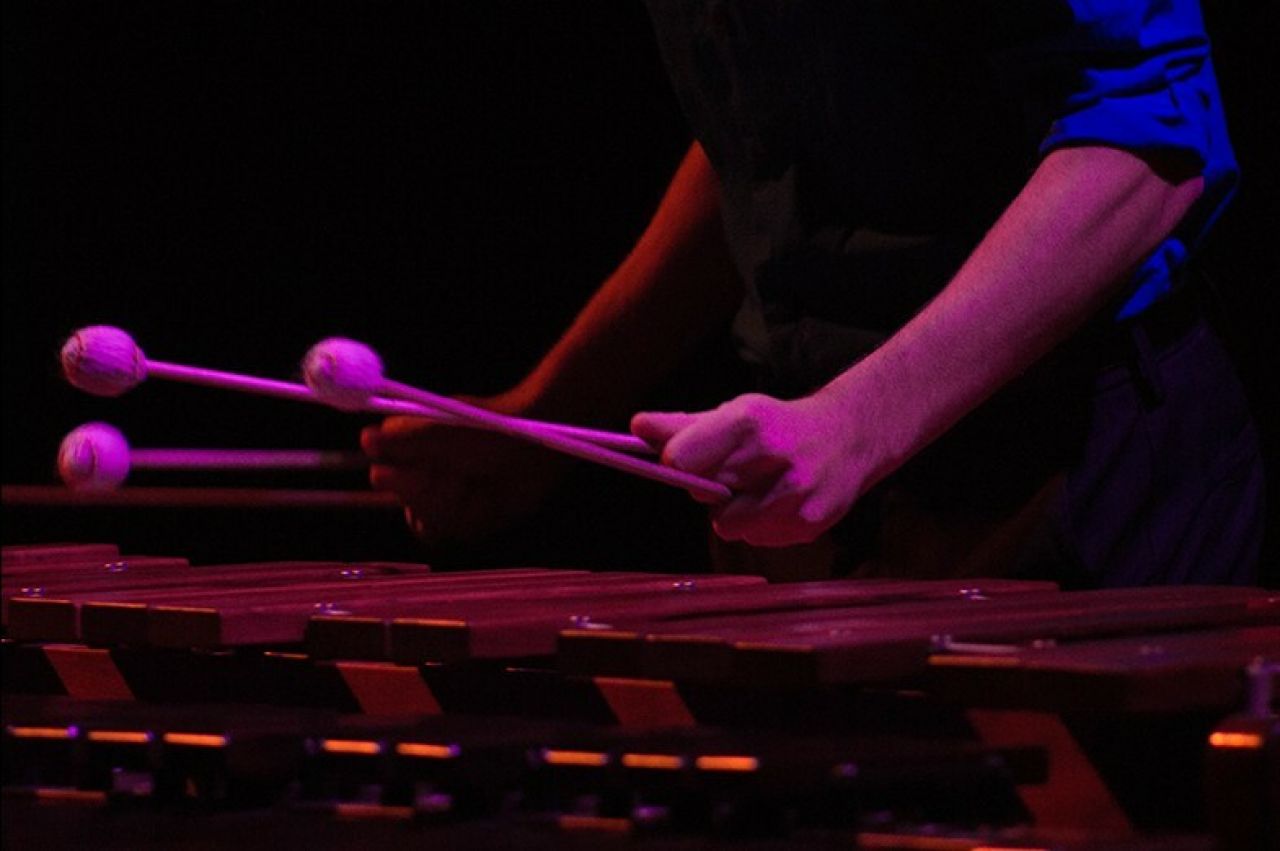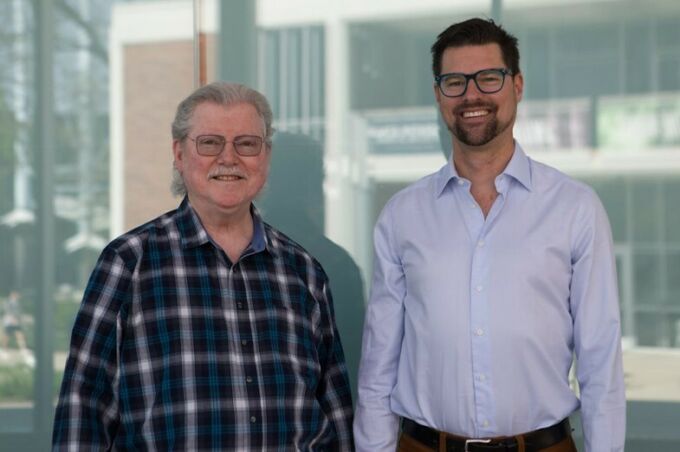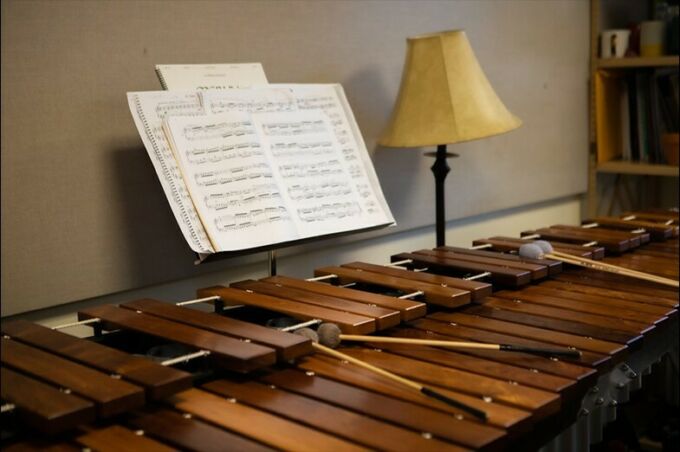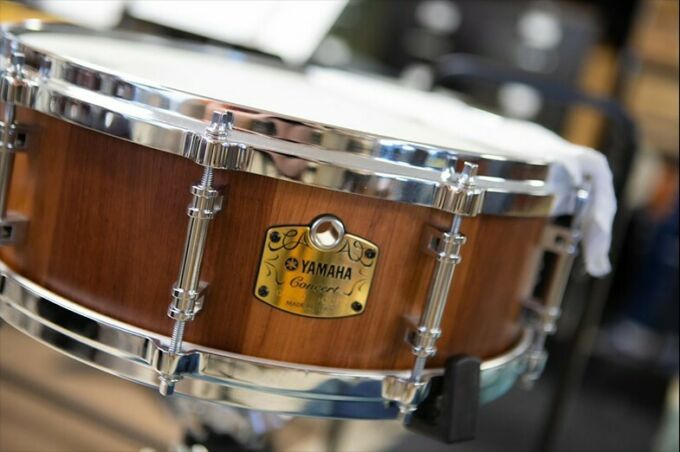June 05, 2023
The beat goes on: Forty years of percussion education at Penn State

The percussion area within the Penn State School of Music in the early 1980s consisted of one rehearsal room and less than a handful of instruments. But with early leadership determined to build a culture focused on proficiency and professionalism, percussion at Penn State over the last 40 years has blossomed into a space where students can learn, develop and inspire.
When Dan Armstrong, professor emeritus and former head of percussion, came to Penn State from Texas in 1982, percussionist and composer Michael Udow was the professor of percussion at the University. After Udow left for the University of Michigan that same year, Armstrong stepped up with a determination to grow percussion at Penn State.
Over the next 38 years of his career, he worked to transform a small area with a handful of instruments into a nationally respected educational springboard for young musicians. The percussion area now has several practice and recital spaces, dozens of instruments and hundreds of accomplished alumni that have performed around the world.
“The success of the students is remarkable, and ultimately what all of the hard work is about, but it wasn't always easy,” said Armstrong, who retired in 2020. “When I arrived, the School of Music was little more than a service organization to the University, but soon after we got a little more attention.”
That attention came when musicologist Bryce Jordan was named Penn State President in 1983.
“When his appointment was announced, you could hear the jaws of the faculty of the School of Music drop. We just couldn't believe it,” Armstrong said. “The fact that they hired a musicologist to lead this agriculture, business and engineering university was a ‘wow' moment.”
Under Jordan's leadership, investments were made in the School of Music and although change was slow, Armstrong said the school was almost immediately elevated.
Ultimately, however, it was up to Armstrong to lead the percussion area through changing times. Lee Hinkle, assistant professor and head of percussion since 2021, said Armstrong did just that.
“What Dan and others have built here at Penn State is nothing short of amazing,” Hinkle said. “I view my role as not only teaching students how to play well and to become well-rounded humans, but also as a steward of percussion at the University.”
Hinkle, an accomplished performing and touring percussionist who came to Penn State from the University of Maryland, has ambitious goals for the percussion area just as Armstrong did. After taking the baton, Hinkle began to hone his vision for what a Penn State percussionist could be in the industry.
For Hinkle, an entrepreneurial mindset is at the center of his music pedagogy. Whether touring or performing in orchestras or ensembles, musicians in the modern workplace are essentially independent contractors, and embracing that approach is key to having solvency within a career in music, he said.
Inside Music Building II is the percussion workshop. The room acts as a storage area for some of the more traditional instruments such as timpani, marimba and chimes, but there are other more obscure items such as Mahler's hammer, which is a large wooden mallet swung overhead like an axe in Mahler's 6th Symphony to strike a wooden box with the “hammer blow of fate.” Of course, there is no Mahler box in the workshop.
Although most of the instruments in the room aren't violently struck with a large hammer, addressing the wear and tear on the instruments is constant. Hinkle said the time in the workshop is almost as important as the recital hall.
“I strive to create an environment in which the students are participating in the process of maintaining the instruments as best as you can,” Hinkle said. “Through the entrepreneurial lens, fixing and maintaining your own equipment is extremely beneficial and can save time and money. I work to instill these types of ideas into my students.”
In the School of Music, students can major in percussion performance as part of the Bachelor of Music, Bachelor of Arts and Bachelor of Music Education degree programs. The school also offers minor programs to students pursuing degrees outside of the arts.
Ensemble and percussion groups perform from a vast repertoire of original works and transcriptions. The students perform with and without a conductor and spend time working on cueing, blending, intonation, musicality and playing solos and accompaniments. The percussion groups, all of which rehearse weekly, offer a joint concert each semester in the Recital Hall.
In preparation for a concert in spring 2023, undergraduate Charles McCall, from Hershey, practiced variations of the Westminster clock theme on a set of practice timpani.
After playing the familiar theme, which can be heard hourly from the cupola of Old Main, McCall held his mallets and reflected on his decision to come to Penn State to study music.
“When I visited campus and the percussion area, I knew this was the place for me,” McCall said. “There is a family atmosphere in the School of Music and Dr. Hinkle and everyone around the students make this a fun place to learn.”
After graduation, McCall and his classmates will have opportunities that only Penn State can offer considering the large alumni base and connection to the music industry, Hinkle said.
The list of music alumni from Penn State reflects professionals that have gone on to a variety of careers, including band directors, orchestral musicians, commercial musicians, music therapists, business owners, music historians, composers, repair technicians, sound designers, concert percussionists and much more.
“Whether it is focusing my lessons on practicing, recording, commissioning, working directly with composers or just generally keeping pace with the industry, I try to prepare our students for success in the industry,” Hinkle said. “I know that at Penn State we are uniquely positioned to help our students succeed and that is a testament to the last 40 years of hard work.”
Story Photos: Lauren Kuykendall


